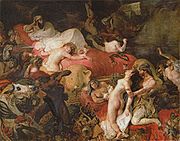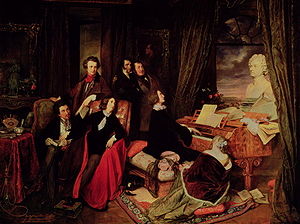
Sardanapale
Encyclopedia


Opera
Opera is an art form in which singers and musicians perform a dramatic work combining text and musical score, usually in a theatrical setting. Opera incorporates many of the elements of spoken theatre, such as acting, scenery, and costumes and sometimes includes dance...
by Franz Liszt
Franz Liszt
Franz Liszt ; ), was a 19th-century Hungarian composer, pianist, conductor, and teacher.Liszt became renowned in Europe during the nineteenth century for his virtuosic skill as a pianist. He was said by his contemporaries to have been the most technically advanced pianist of his age...
based loosely on the 1821 verse play Sardanapalus by Lord Byron.
Background
Liszt was motivated to write a large scale opera at least partly in an attempt to be recognised as more than a travelling keyboard virtuoso. (His early one-act opera, Don SancheDon Sanche
Don Sanche, ou Le château de l'amour , S.1, is an opera in one act composed in 1824-25 by Franz Liszt, with French libretto by Théaulon and de Rancé, based on a story by Jean-Pierre Claris de Florian. For 30 years it was believed to be lost until it was rediscovered in 1903...
, could hardly qualify to raise his status.) Originally he intended to write an opera based on Byron's The Corsair
The Corsair
The Corsair was a semi-autobiographical tale in verse by Lord Byron in 1814 , which was extremely popular and influential in its day, selling ten thousand copies on its first day of sale...
, and even obtained in 1844 a libretto by Alexandre Dumas père. Eventually in 1845 he settled on the subject of Sardanapalus. At this time Liszt was working at the court in Weimar
Charles Frederick, Grand Duke of Saxe-Weimar-Eisenach
Charles Friedrich, Grand Duke of Saxe-Weimar-Eisenach was a Grand Duke of Saxe-Weimar-Eisenach.-Biography:Born in Weimar, he was the eldest son of Charles Augustus, Grand Duke of Saxe-Weimar-Eisenach and Luise Auguste of Hesse-Darmstadt.Charles Frederick succeeded his famous father as Grand Duke...
, but may have had his eyes on opportunities at the Hoftheater, Vienna
Theater am Kärntnertor
Theater am Kärntnertor or Kärntnertortheater was a prestigious theatre in Vienna during the eighteenth and nineteenth centuries...
, where the Kapellmeister
Kapellmeister
Kapellmeister is a German word designating a person in charge of music-making. The word is a compound, consisting of the roots Kapelle and Meister . The words Kapelle and Meister derive from the Latin: capella and magister...
, Gaetano Donizetti
Gaetano Donizetti
Domenico Gaetano Maria Donizetti was an Italian composer from Bergamo, Lombardy. His best-known works are the operas L'elisir d'amore , Lucia di Lammermoor , and Don Pasquale , all in Italian, and the French operas La favorite and La fille du régiment...
, was seriously ill (although he did not in fact die until 1848). A large-scale opera could have placed Liszt in the running for Donizetti's influential post, as he wrote in an 1846 letter to the Comtesse d'Agoult
Marie d'Agoult
Marie Catherine Sophie de Flavigny, Vicomtesse de Flavigny , was a French author, known also by her married name and title, Marie, Comtesse d'Agoult, and by her pen name, Daniel Stern....
. In correspondence with his close associate the Princess Belgiojoso
Cristina Trivulzio Belgiojoso
Cristina Trivulzio di Belgiojoso was an Italian noblewoman who played a prominent part in Italy's struggle for independence. She is also notable as a writer and journalist.-Life:...
, Liszt planned to have the opera performed in Milan
La Scala
La Scala , is a world renowned opera house in Milan, Italy. The theatre was inaugurated on 3 August 1778 and was originally known as the New Royal-Ducal Theatre at La Scala...
in 1846-7.
Sardanapalus was, according to the writer Ctesias
Ctesias
Ctesias of Cnidus was a Greek physician and historian from Cnidus in Caria. Ctesias, who lived in the 5th century BC, was physician to Artaxerxes Mnemon, whom he accompanied in 401 BC on his expedition against his brother Cyrus the Younger....
, the last king of Assyria
Assyria
Assyria was a Semitic Akkadian kingdom, extant as a nation state from the mid–23rd century BC to 608 BC centred on the Upper Tigris river, in northern Mesopotamia , that came to rule regional empires a number of times through history. It was named for its original capital, the ancient city of Assur...
. Some have identified him with Assurbanipal, but the Sardanapalus of Ctesias, "an effeminate debauchee, sunk in luxury and sloth, who at the last was driven to take up arms, and, after a prolonged but ineffectual resistance, avoided capture by suicide" is not an identifiable historical character. Ctesias's tale (the original is lost) was preserved by Diodorus Siculus
Diodorus Siculus
Diodorus Siculus was a Greek historian who flourished between 60 and 30 BC. According to Diodorus' own work, he was born at Agyrium in Sicily . With one exception, antiquity affords no further information about Diodorus' life and doings beyond what is to be found in his own work, Bibliotheca...
, and it is on this account that Byron based his play.
Liszt had been present at the 1830 premiere of the oratorio 'The Death of Sardanapalus' by Hector Berlioz
Hector Berlioz
Hector Berlioz was a French Romantic composer, best known for his compositions Symphonie fantastique and Grande messe des morts . Berlioz made significant contributions to the modern orchestra with his Treatise on Instrumentation. He specified huge orchestral forces for some of his works; as a...
, which featured an immolation scene as shown in Eugène Delacroix
Eugène Delacroix
Ferdinand Victor Eugène Delacroix was a French Romantic artist regarded from the outset of his career as the leader of the French Romantic school...
's sensational 1828 painting of the subject (illustration). These influences probably led Liszt to a similarly sensational concept. By 1849, when he at last began to write the music, he conceived the idea of further altering the libretto by adding an orgy scene as in Delacroix, but this was turned down by Belgiojoso.
Liszt's dilatoriness
An initial libretto, byJean Pierre Mallefille
Jean Pierre Félicien Mallefille
Jean Pierre Félicien Mallefille was a French novelist and playwright.Mallefille was born in Mauritius. He wrote a number of plays, including Glenarvon , Les sept enfants de Lara , Le cœur et la dot , and Les sceptiques , as well as two comedies, and two novels, Le collier and La confession du...
, was both late and unacceptable. An unknown friend of Belgiojoso delivered a libretto, in Italian, in 1847, and Liszt was then confident of completing the work in 1848. However, by 1849 he had still not written a note of music.
Eventually Liszt wrote 111 pages of score, (now in the 'Goethe-und-Schiller Archiv' in Weimar) and wrote to Richard Wagner
Richard Wagner
Wilhelm Richard Wagner was a German composer, conductor, theatre director, philosopher, music theorist, poet, essayist and writer primarily known for his operas...
that it would be ready for production on Paris
Paris
Paris is the capital and largest city in France, situated on the river Seine, in northern France, at the heart of the Île-de-France region...
or London
London
London is the capital city of :England and the :United Kingdom, the largest metropolitan area in the United Kingdom, and the largest urban zone in the European Union by most measures. Located on the River Thames, London has been a major settlement for two millennia, its history going back to its...
in 1852. Soon after this he seems to have abandoned his work on the opera. The musicologist Kenneth Hamilton
Kenneth Hamilton
Kenneth Hamilton is a Scottish pianist and writer, known for his virtuoso performances of Romantic music, especially Liszt, Alkan and Busoni. Hamilton's playing is characterized by spontaneity, a spectacular technique and the cultivation of a wide variety of keyboard colour...
suggests that his diffidence may have been induced by reading Wagner's essay Oper und Drama, by the standards of which Sardanapale would have appeared extremely dated.
Planned completion
The British musicologist David Trippett is planning a reconstruction of the opera.Sources
- Kenneth Hamilton, "Not with a bang but a whimper: The death of Liszt's 'Sardanapale' ", Cambridge Opera Journal 8/1 (1996), 45-58
- Kenneth Hamilton, "Elective affinities: Wagner and Liszt", in Richard Wagner and his World, ed. Thomas S. Grey, Princeton (2009), 27-64
- Daniel Ollivier, Correspondence de Liszt et de la Comtesse d'Agoult, Paris, 1933-4.

